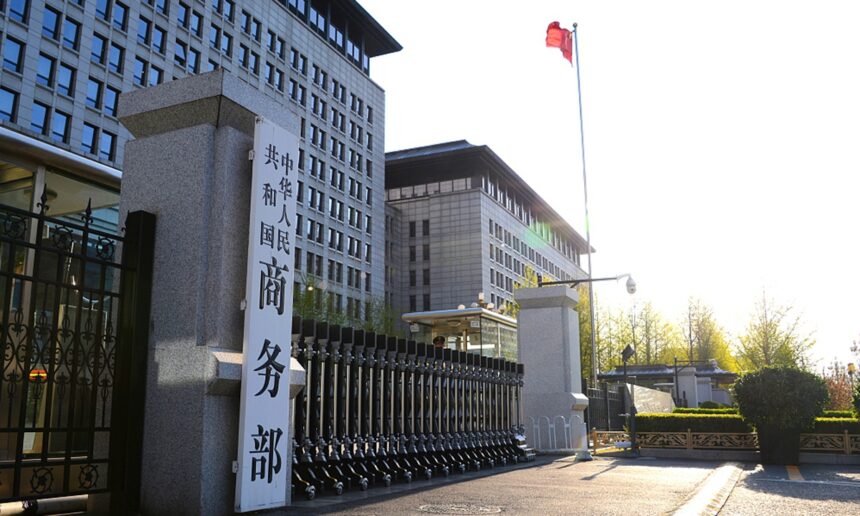By Yin Yeping and Qi Xijia–
In response to US Trade Representative (USTR)’s announcement on Friday local time to seek public comment on proposed actions in Section 301 Investigation of China’s maritime, logistics, and shipbuilding sectors, China’s Ministry of Commerce (MOFCOM) on Sunday urged the US to respect facts and rules and halt its wrong actions, saying that China will closely watch US moves and take necessary steps to safeguard its legitimate rights and interests.
On Friday local time, the USTR claimed that “it is inviting comments from the public on proposed Section 301 actions aimed to obtain the elimination of China’s acts, policies, and practices targeting the maritime, logistics, and shipbuilding sectors for dominance,” according to the official website of the US trade agency.
USTR will hold a public hearing about the proposed actions on March 24. The deadline for submission of comments will also be on the same day, per the USTR.
Since March 2024, China and the US have held several rounds of talks on the US investigations. China has repeatedly voiced its stance on the Section 301 investigation, urged the US to be rational and objective, stop blaming China for its domestic industrial issues. Regrettably, the US has persisted in its wrongdoings, a spokesperson of the MOFCOM said on Sunday.
The MOFCOM noted that the previous US Section 301 tariffs on China were ruled by the WTO panel as violating WTO rules and opposed by many WTO members. Driven by domestic politics, the US has abused Section 301 investigations, further undermining the multilateral trading system.
Proposed US restrictive measures like port fee impositions will fail to revive the US shipbuilding industry, and will raise shipping costs, fuel US inflation, weaken US goods’ global competitiveness and harm US port-related interests. There’s strong domestic opposition, and relevant countries and organizations also oppose and are dissatisfied with the US investigations.
China urges the US to respect facts and multilateral rules, and to stop its wrong actions. China will closely monitor the actions of the US, and take necessary measures to defend its legitimate rights and interests, the spokesperson said.
Unilateral move
The 301 investigation, which was initially pushed by the previous Biden administration, last year, continues as a flawed move that lacks solid factual evidence, Zhou Mi, a senior research fellow at the Chinese Academy of International Trade and Economic Cooperation, told the Global Times on Sunday.
According to a Reuters report, then US Trade Representative Katherine Tai launched in April 2024 the probe reportedly at the request of five US unions under Section 301 of the Trade Act of 1974.
However, the USTR fails to understand the underlying causes, Zhou said, noting that “in today’s international trade environment, industries like logistics are crucial for global trade stability and economic sustainability … Restrictive measures will only worsen supply chain instability and elevate inflationary pressures on the US economy.”
Additionally, these measures will undermine the global competitiveness of US industries. Zhou said that port logistics, for instance, is an important sector for US employment, and “if companies reduce their connections with key ports due to these measures, it will put significant pressure on their global operations and employment.”
Wide concerns
The US’ unilateral move has led to strong oppositions and concerns from industry players and representative groups. They have argued that Section 301 probe lacks a factual basis and could lead to rise of prices and production costs in the US, and also hurt American exports.
“This move is an extension of US unilateral trade protectionism and specific measures in an attempt to contain China, expanding from trade tariffs to targeting trade transport and logistics,” Kang Shuchun, a director of the China Federation of Logistics and Purchasing, told the Global Times on Sunday, warning that its potential impact would be long-term, wide-ranging, and deep, including creating potential disruption in the US supply chain, raising prices and production costs in the US, and also hurt American exports.
Moreover, the US is focusing solely on restrictions on Chinese industries while overlooking the bilateral and multilateral impacts on transportation, Kang said, noting that this move could drive up global shipping prices and affect US soybean and energy exports – two sectors that heavily rely on shipping – while weakening their competitiveness in the international market.
Previously, in responding to the Biden administration’s Section 301 investigation into China’s maritime, logistics and shipbuilding sectors, China Association of the National Shipbuilding Industry (CANSI) said in a statement in January that the Biden administration irresponsibly initiated the Section 301 investigation into China’s maritime, logistics, and shipbuilding industries, and based on erroneous investigations, it reached incorrect conclusions filled with lies and distortions.
China Shipowners’ Association (CSA) also said in a previous response in January to the US move that the conclusion disregards the historical development of the global shipbuilding and shipping industries.
“Currently, China’s shipping industry mainly serves its import and export trade, and the transportation of goods to and from the US is conducted in full compliance with relevant laws. It is entirely illogical to blame the development situation of the US maritime, logistics, and shipbuilding industries on Chinese policies, as it does not align with basic historical facts,” CSA said in the statement.
“The US’ claim that China’s dominance in related industries are affecting American businesses is unfounded, as global market competition is open and governed by unified international rules,” Huo Jianguo, a vice chairman of the China Society for World Trade Organization Studies in Beijing, told the Global Times on Sunday, noting that US action is politically motivated, aimed at suppressing Chinese industries and companies.
“Ultimately, this unilateral move will hurt US industries and impose additional costs on American businesses under the guise of protecting them,” Huo said, noting that if the US imposes extra fees on Chinese-made vessels docking at US ports, it will drive up logistics costs at American ports, with the burden ultimately falling on US importers and consumers.











